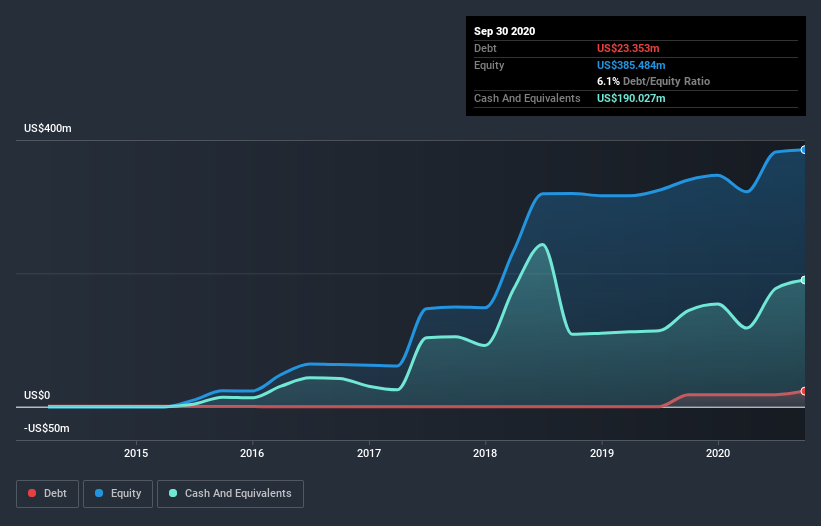The external fund manager backed by Berkshire Hathaway's Charlie Munger, Li Lu, makes no bones about it when he says 'The biggest investment risk is not the volatility of prices, but whether you will suffer a permanent loss of capital.' So it seems the smart money knows that debt - which is usually involved in bankruptcies - is a very important factor, when you assess how risky a company is. As with many other companies Boston Omaha Corporation (NASDAQ:BOMN) makes use of debt. But is this debt a concern to shareholders?
When Is Debt A Problem?
Generally speaking, debt only becomes a real problem when a company can't easily pay it off, either by raising capital or with its own cash flow. Ultimately, if the company can't fulfill its legal obligations to repay debt, shareholders could walk away with nothing. However, a more frequent (but still costly) occurrence is where a company must issue shares at bargain-basement prices, permanently diluting shareholders, just to shore up its balance sheet. Having said that, the most common situation is where a company manages its debt reasonably well - and to its own advantage. The first step when considering a company's debt levels is to consider its cash and debt together.
See our latest analysis for Boston Omaha
What Is Boston Omaha's Net Debt?
You can click the graphic below for the historical numbers, but it shows that as of September 2020 Boston Omaha had US$23.4m of debt, an increase on US$18.1m, over one year. But on the other hand it also has US$190.0m in cash, leading to a US$166.7m net cash position.

A Look At Boston Omaha's Liabilities
The latest balance sheet data shows that Boston Omaha had liabilities of US$24.6m due within a year, and liabilities of US$69.9m falling due after that. Offsetting this, it had US$190.0m in cash and US$3.65m in receivables that were due within 12 months. So it actually has US$99.3m more liquid assets than total liabilities.
This short term liquidity is a sign that Boston Omaha could probably pay off its debt with ease, as its balance sheet is far from stretched. Succinctly put, Boston Omaha boasts net cash, so it's fair to say it does not have a heavy debt load! When analysing debt levels, the balance sheet is the obvious place to start. But it is future earnings, more than anything, that will determine Boston Omaha's ability to maintain a healthy balance sheet going forward. So if you're focused on the future you can check out this free report showing analyst profit forecasts.
In the last year Boston Omaha wasn't profitable at an EBIT level, but managed to grow its revenue by 18%, to US$46m. We usually like to see faster growth from unprofitable companies, but each to their own.
So How Risky Is Boston Omaha?
While Boston Omaha lost money on an earnings before interest and tax (EBIT) level, it actually generated positive free cash flow US$1.2m. So taking that on face value, and considering the net cash situation, we don't think that the stock is too risky in the near term. With mediocre revenue growth in the last year, we're don't find the investment opportunity particularly compelling. When analysing debt levels, the balance sheet is the obvious place to start. But ultimately, every company can contain risks that exist outside of the balance sheet. Take risks, for example - Boston Omaha has 3 warning signs (and 1 which can't be ignored) we think you should know about.
Of course, if you're the type of investor who prefers buying stocks without the burden of debt, then don't hesitate to discover our exclusive list of net cash growth stocks, today.
If you decide to trade Boston Omaha, use the lowest-cost* platform that is rated #1 Overall by Barron’s, Interactive Brokers. Trade stocks, options, futures, forex, bonds and funds on 135 markets, all from a single integrated account. Promoted
Valuation is complex, but we're here to simplify it.
Discover if Boston Omaha might be undervalued or overvalued with our detailed analysis, featuring fair value estimates, potential risks, dividends, insider trades, and its financial condition.
Access Free AnalysisThis article by Simply Wall St is general in nature. It does not constitute a recommendation to buy or sell any stock, and does not take account of your objectives, or your financial situation. We aim to bring you long-term focused analysis driven by fundamental data. Note that our analysis may not factor in the latest price-sensitive company announcements or qualitative material. Simply Wall St has no position in any stocks mentioned.
*Interactive Brokers Rated Lowest Cost Broker by StockBrokers.com Annual Online Review 2020
Have feedback on this article? Concerned about the content? Get in touch with us directly. Alternatively, email editorial-team (at) simplywallst.com.
About NYSE:BOC
Boston Omaha
Engages in the outdoor billboard advertising business in the southeast United States.
Adequate balance sheet with minimal risk.
Similar Companies
Market Insights
Weekly Picks


Crazy Undervalued 42 Baggers Silver Play (Active & Running Mine)


Fiducian: Compliance Clouds or Value Opportunity?

Willamette Valley Vineyards (WVVI): Not-So-Great Value
Recently Updated Narratives


When will fraudsters be investigated in depth. Fraud was ongoing in France too.


Staggered by dilution; positions for growth
China Starch Holdings eyes a revenue growth of 4.66% with a 5-year strategic plan
Popular Narratives


MicroVision will explode future revenue by 380.37% with a vision towards success


NVDA: Expanding AI Demand Will Drive Major Data Center Investments Through 2026





